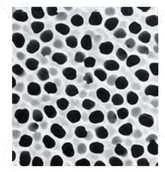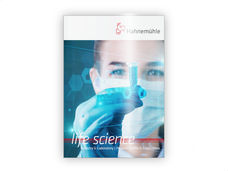Superglue for cells
Scientists in Canada have developed a super-strong membrane adhesive that can stick red blood cells together. The polymer, which is based on the phospholipid head group phosphatidyl choline, could be used to secure cells in particular positions for tissue engineering and wound closure.
Research describes how the scientists inverted phosphatidyl choline to choline phosphate (CP) and incorporated this into a water-soluble polymer to produce a positively-charged material containing a controlled number of CP groups that was shown to bind to a variety of cell membranes through electrostatic interactions. The team tested the adhesive capabilities of the new polymer on red blood cells and found that although the cells aggregated together very strongly, there was no damage to the cell membranes, suggesting that the polymer could be used as a tissue sealant.
Other news from the department science
These products might interest you

Anopore™ by Cytiva
Precise filtration made easy with Anopore inorganic membranes
The aluminum oxide filter membrane that can increase the purity or yield of your analyte

Hahnemühle LifeScience Catalogue Industry & Laboratory by Hahnemühle
Wide variety of Filter Papers for all Laboratory and Industrial Applications
Filtration Solutions in the Life Sciences, Chemical and Pharmaceutical Sectors

Get the chemical industry in your inbox
By submitting this form you agree that LUMITOS AG will send you the newsletter(s) selected above by email. Your data will not be passed on to third parties. Your data will be stored and processed in accordance with our data protection regulations. LUMITOS may contact you by email for the purpose of advertising or market and opinion surveys. You can revoke your consent at any time without giving reasons to LUMITOS AG, Ernst-Augustin-Str. 2, 12489 Berlin, Germany or by e-mail at revoke@lumitos.com with effect for the future. In addition, each email contains a link to unsubscribe from the corresponding newsletter.




























































